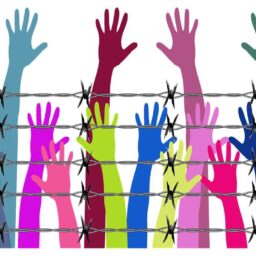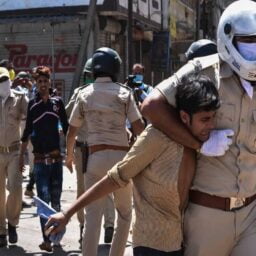INTRODUCTION
North Korea- a country that has frequently been talked about for its trade and nuclear power, a country known for its arbitrary leader, and a country whose real problems are yet to be discussed on international platforms. Most of us know that it is rather hard to contact North Korean citizens from outside of the country which is exactly why the condition of citizens within the North Korean State, is still vague and unknown.
The United Nations Commission of Inquiry on Human Rights in the Democratic People’s republic of Korea, in its report of 2014 has mentioned that “systematic, widespread and gross Human Rights violation have been and are being done by the Democratic People’s Republic of Korea.”[1] Some of the issues faced by the North Koreans are as follows:
- Violations of the freedoms of thought, expression and religion: North Korea has the most strictly controlled media in the entire world. No wonder it takes the last place in the World Press Freedom index,2021 by Reporters without Borders. The People of North Korea get all their information from state-controlled media outlets, that undoubtedly praises the leadership, brainwashing the citizens to believe every word of their leader and worship him. The use of cell phones is more common but overseas calls are prohibited and if the North Koreans want to communicate to their loved ones staying overseas, they do it via Chinese mobile phones risking being thrown into prison for doing so. Internet is accessible to a few elites residing in Pyeongyang and the locals get restricted access to it through the country’s Intranet. All this has not only led North Koreans to be deprived of any information from the outside world but also, they are deprived of the chances of telling the world about their conditions and denial of human rights.[2]
Although the constitution of India promises the ‘Right to Faith’, it has never been followed. The Christians are not allowed to practice their religion outside of state-controlled churches and they could face severe punishments for doing so, given that they need to be caught but it is rather easy to catch the offenders as the whole country is under the strict surveillance of the government.
- Violation of freedom of movement: The North Korean state follows a policy of isolating citizens from contact with each other and the outside world. Aside from not being allowed to travel outside of their state, they are not even allowed to freely travel within their borders without official authorization. The offenders get thrown back to their original province for travelling within their country. The offenders who try to leave the country are thrown into labour camps where they face various kinds of inhumane conditions. All of this is being done in order to minimize sharing of information and maximizing state control.
- Arbitrary detention, torture, executions and prison camps: The North Koreans face rather arbitrary detentions. They could be detained for anything, even minimal acts like watching a south Korean CD. Torture, starvation and other inhumane conditions are used during the interrogation process to make sure the offenders confess their crimes. People found to be engaged in ‘political crimes’ face brutal torture in the prison camps. They face deliberate starvation, torture, executions, forced labour, rape etc., inside those prison camps. North Korea is also said to follow collective punishments i.e. if a person commits a political crime, then his whole family will be sent to prison camps as an associated offender.
North Korea follows arbitrary executions, whether it’s in secret or public. Public executions are often used by the government of North Korea to instil a sense of fear into the citizens of North Korea.[3]
- Discrimination: We know that discrimination is seen in all societies but North Korea practices it to a different extent. North Korea is a rigidly stratified society whose discrimination has its roots in its traditional Songbun system, which classifies people on the basis of State-assigned social class and birth. This Songbun system used to be the most important factor in determining the individual’s accommodation, occupation, place of living, amount of food and even marriage partners. People often use bribes to get away with the rules of this songbun system, which is still strictly followed in North Korea. But a large part of the North Korean society which does not have the required resources or favourable songbun, tend to get marginalized and hence, they suffer.
Women of North Korea face widespread Gender Discrimination. North Korean society has a patriarchal attitude and violence against women is very common. They are deprived of political, economic, social rights as the state have put blatant discriminatory restrictions upon the females to maintain its idea of gender stereotype. The women are even denied their human rights which is not at all surprising in a country where every machinery is state-controlled. They face a high level of sexual violence and harassment in addition to the abuses suffered by the population in general. The North Korean state is said to have pleasure squads for the leaders of political men of the state.
A report published by the Office of the UN High Commissioner for Human Rights (OHCHR) on 28th July 2020 also said “Women face gender-specific human rights violations when subjected to arrest and detention in the Democratic People’s Republic of Korea. This includes increased risk to sexual violence, including during strip searches and invasive body searches, as well as other forms of gender-based physical or verbal violence; denial of access to facilities and materials required to meet women’s specific hygiene needs, including sanitary towels provided free of charge; violations of sexual and reproductive health and rights.”
- Violations of the right to food and related aspects of the right to life: The state-controlled distribution of food is highly unequal as it follows the songbun system. The people who are not in a favourable position either because of the lack of resources or because of the songbun are left to starve which has resulted in chronic malnutrition in children. According to UNICEF, 200,000 children are suffering from acute malnutrition. The state also uses food as a means to control the population.
The state uses deliberate starvation as a form of punishment in the detention centres.
The United Nations Commission of Inquiry on Human Rights in the Democratic People’s republic of Korea, in its report of 2014 has mentioned that “The commission found evidence of systematic, widespread and grave violations of the right to food in the Democratic People’s Republic of Korea. While acknowledging the impact of factors beyond State control over the food situation, the commission finds that decisions, actions and omissions by the State and its leadership caused the death of at least hundreds of thousands of people and inflicted permanent physical and psychological injuries on those who survived.”[4]
- Abductions and Foreign detentions: The state is said to detain the travelling foreign nationals for vague reasons in order to use them for their political reasons- mostly to use them as a pawn at opportune moments. In 2018, three US citizens who were jailed for anti-state activities and were placed in labour camps were released as a gesture of Goodwill, just before the US-North Korea leadership Summit took place.
North Korea has also admitted to having kidnapped 13 Japanese citizens in the 1970s- some of them being, Megumi Yokota, Rumiko Masumoto, Yaeko Taguchi who were later proclaimed dead by the North Korean state.[5]
CONCLUSION
Despite the promises made by the Democratic People’s Republic of Korea, these issues have been found to be pretty common in the state, which clearly suggests that North Korea has not been living up to its promises. The state follows a totalitarian government that focuses on its political propaganda and favours those who are useful or one can say ‘loyal’ to the political power. The State ignores the welfare of its masses, violates their rights and forces or compels them to behave accordingly, whether it’s by using force, brainwashing, or terrorizing them. But the concerning fact is that even though these inhumane conditions have been found to be prevailing in the state, the international platforms have never really addressed these issues which pose the question that Why these problems regarding the sufferings of North Koreans have never been raised? All we get to see or hear about the North Korean state is about their nuclear plans and Military power. Why do all the talks and summits with North Korea always revolve around their nuclear plans? Well, it is unknown when these questions are going to be answered but it is high time for everyone to realize that the welfare of innocent North Korean civilians needs to be prioritized, so that they don’t have to risk their lives on a daily basis to enjoy their basic human rights.
Author(s) Name: Swetangi Ranjan (Central University of South Bihar, Gaya)
References:
[1] UNGA ‘Report of the commission of inquiry on human rights in the Democratic People’s Republic of Korea’(17 February 2014) UN Doc A/HRC/25/63
[2] Amnesty International, ‘North Korea: Tightened Control on Communications with the outside world leave families devastated’ (Amnesty International, 9 march 2016) <https://www.amnesty.org/en/latest/news/2016/03/north-korea-connection-denied/> accessed 5 sept 2021
[3] BBC ‘North Korea’s Human Rights: What’s not being talked about’ (www.bbc.com 18 February 2019) https://www.bbc.com/news/world-asia-44234505 accessed 5 September 2021
[4] UNGA ‘Report of the commission of inquiry on human rights in the Democratic People’s Republic of Korea’(17 February 2014) UN Doc A/HRC/25/63
[5] Rebecca seales and Hideharu Tamura ‘snatched from a beach to train North Korea’s spies’ (BBC.com, 7 February 2021) <https://www.bbc.com/news/world-asia-55651578> accessed 6 September 2021






